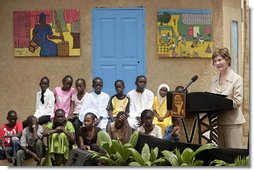|
Home >
News & Policies >
June 2007
|
For Immediate Release
Office of the First Lady
June 26, 2007
Mrs. Bush's Remarks on the Africa Education Initiative
Grand Medine Primary School
Dakar, Senegal
11:40 A.M. (Local)
MRS. BUSH: Thank you, Mr. Minister. Thank you for your very kind words. I appreciate it. I'd like to acknowledge Mrs. Wade. Thank you very much, Madame Wade, for joining me today. I appreciate it very much. Mr. Diop, the principal, thank you for letting us be here at your school today. Mrs. Barka from UNESCO, thank you very much for joining us. Governor Diaw, we're so glad to be here. And Deputy Governor Dia, thank you for everything. And I'm especially happy that Youssou N'Dour has joined us. Thank you very, very much for being with us.
 President Bush and I met Youssou N'Dour at the G8 when we were in Germany,
and he was there representing Senegal. And we enjoyed seeing you very
much.
President Bush and I met Youssou N'Dour at the G8 when we were in Germany,
and he was there representing Senegal. And we enjoyed seeing you very
much.
And I'd like to introduce to all of you my daughter, Jenna, who has joined me here today. Jenna is a teacher in a school in Washington, D.C.
Students, faculty and distinguished guests, thanks to each and every one of you for welcoming me to the Grand Medine School, and to your beautiful country of Senegal. I'm delighted to be in Dakar to talk about what each of us can do to improve education in Senegal and in countries around the world.
In 2000, representatives of 164 nations gathered in Dakar for the World Education Forum. At this conference, more than a thousand leaders renewed their commitment to UNESCO's goal of Education for All by 2015. These leaders committed to investing in education -- for men, women, children, rich and poor.
An investment in education, no matter how significant, is always worth it. By investing in education, governments meet their other fundamental obligations: to improve opportunities for children and families, to strengthen their economies, and to keep their citizens in good health.
I know that the people of Senegal are committed to improving education in your country. Last September, Madame Wade joined me in New York for the White House Conference on Global Literacy. Thank you, Madame Wade, for your contributions to the conference, and to your country. (Applause.)
As the people of Senegal improve education for children, the American people are proud to partner with you. In 2002, our government launched the Africa Education Initiative, which provides scholarships to African girls, and which will train more than 900,000 teachers across the continent of Africa by the end of the decade.
In its first four years, the initiative has trained nearly 4,000 teachers in Senegal. AEI has provided Ambassador's Scholarships for nearly 1,300 Senegalese girls. Five of these accomplished young women are with us today. They've come from different villages to be recognized, the five new scholarship winners: Christine Ndiaye, Nango Dang, Khady Diome, Yamama Diop, and Fatou Djiby Faye. Congratulations to each of you girls. (Applause.) Here they are.
Nango says her scholarship gives her an opportunity few girls in her rural village have ever had: the chance to be educated past primary school. Now Nango plans to become the first girl in her village to attend a university.
One of the greatest obstacles to education in Nango's village and in many communities throughout Africa is a shortage of textbooks. So through the African Education Initiative, six American universities have partnered with six African countries to produce and print primary-school textbooks. AEI has supplied nearly half a million books for children here in Senegal.
Senegal's partner in the Textbooks Learning and Materials program is Elizabeth City State University in North Carolina. The chancellor of the university, Willie Gilchrist, is here today. The books produced are African centered, and tailored to the culture and curriculum of Senegal. Dr. Willie Gilchrist. (Applause.)
Many of these books were first tested here at the Grand Medine School. Your vice principal, Mrs. Ba, says they've already brought new life into the classrooms. The old texts dated back to 1979 -- before computers, before cell phones, before the Internet. The new books are up to date, and students are eager to learn about the technologies that are transforming everyday life in Senegal.
Today, I'm delighted to announce that even more communities will benefit from these new books. Over the summer, AEI will deliver another 800,000 textbooks to Senegalese children. I'm delighted to present Mrs. Ba with some of these books for the Grand Medine School. The rest will go to children across Senegal. (Applause.)
By investing in education, Senegal is making sure that your country's citizens will be active and engaged for generations to come. Educated citizens will keep themselves in better health, and strengthen Senegal's role in the global economy. Educated women will pass their knowledge along to their communities and to their children. And, as Senegal stands to benefit from these investments in education, the American people are very proud to stand with you.
Thank you very much for welcoming me to your school and to your country. I wish all the young people here the very best for your studies and for your future careers. And I look forward to strengthening the friendship between our countries through our shared commitment to education.
Thank you all very much. (Applause.)
END 11:54 A.M. (Local)
![]() Printer-Friendly Version
Printer-Friendly Version
![]() Email This Page
Email This Page


